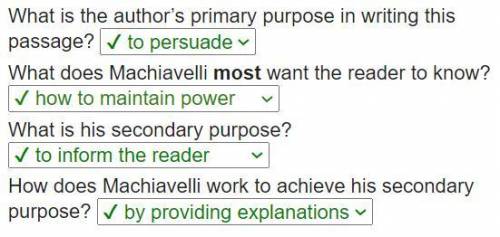What is the author’s primary purpose in writing this passage?
✔ to persuade
What does Machiavelli most want the reader to know?
✔ how to maintain power
What is his secondary purpose?
✔ to inform the reader
How does Machiavelli work to achieve his secondary purpose?
✔ by providing explanations
(Photo for proof at the bottom.)
Explanation:
Machiavelli uses words like "because" to persuade by using a "cause and effect" structure. The quote, "there are three courses for those who wish to hold them" indicates the second answer. The passage lacks humor and suspense, so the only right answer is "to inform the reader" for the third question. He provides explanations in his "cause and effect" structure and explains why things happen.
Here's a photo of Edge incase you're doubtful.
Please click the heart if this helped.
